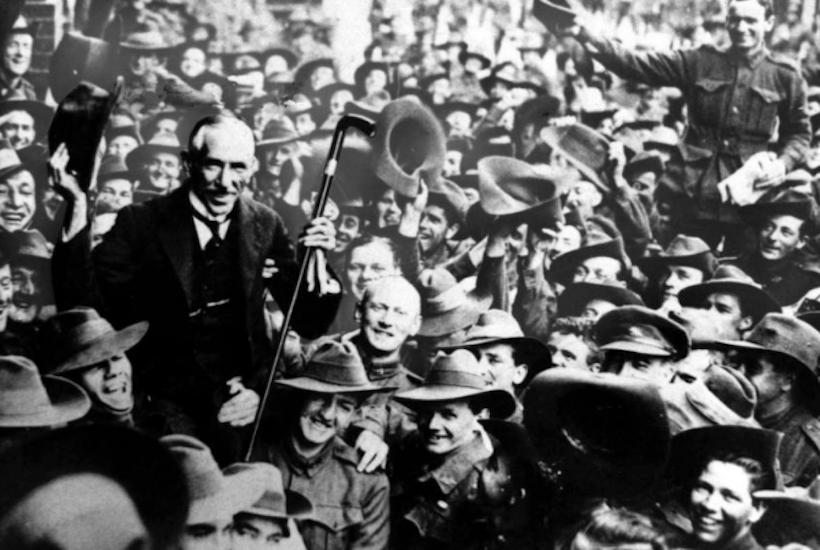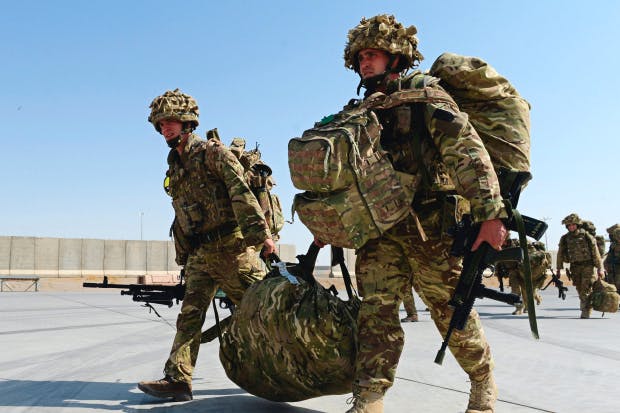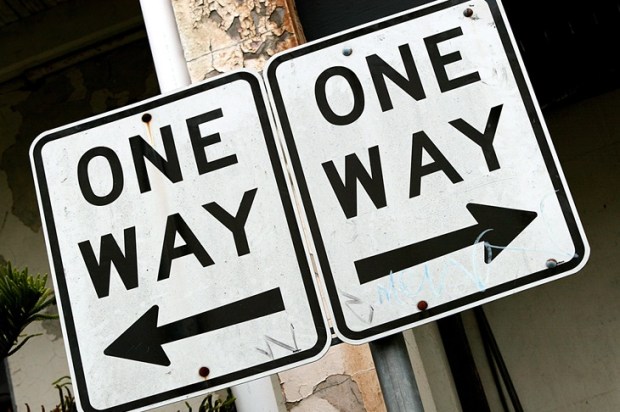The last Australians to stand up to bullying by the United States were World War I General John Monash and prime minister Billy Hughes.
Monash refused to budge when the US insisted its soldiers would not fight under foreign command in Monash’s meticulously planned 1918 battle at Hamel.
Monash stood his ground, the US backed down and Hamel remains a textbook battle of all arms involvement, command and control.
At the 1919 peace conference at Versailles when Democrat US President Wilson dismissed Hughes as representing a nation of a mere five million, the latter feistily responded, “I represent 60,000 dead. How many do you represent*?”
Perhaps it was at Versailles rather than Gallipoli Australia became a nation, though subservience to US geopolitical interests has remained a recurring theme
Writing three weeks after the Japanese attack on Pearl Harbor in December 1941, Labor Prime Minister John Curtin declared: ‘Without any inhibitions of any kind, I make it quite clear that Australia looks to America, free of any pangs as to our traditional links or kinship with the United Kingdom.’
For 80 years since with three singular exceptions plus UN-sanctioned missions, Australia has linked itself strategically and militarily with the US, though contrary to Monash’s stubborn insistence, always as a subservient partner.
Since 1952 through various iterations Australia has been a signatory to the ANZUS Treaty, linking our regional strategic responsibilities with those two traditional allies.
Indeed in 2001 following the multiple terrorist attacks on US soil, prime minister John Howard, who was in Washington, invoked the treaty beginning Australia’s 20-year military involvement in Afghanistan.
Politicians, historians and academics may argue the rationale of that decision from their ideological persuasion ad infinitum, the reality has been we’ve been involved from then until the ignominious US withdrawal.
Those who distil great wars into mere statistics have little understanding of time, space or cost.
Except on August 26, 2021, America lost 14 marines in a single incident, more than one-quarter of Australia’s total battlefield casualties over 20 years.
The event was as unnecessary as it was predictable.
Perhaps the man who will prove the worst US president ever made a decision, or more likely had it made for him, for crass political reasons rather than sound military strategy.
The families of each one of those dead Marines, widows, orphans and parents, not to mention those collaterally wounded, have a right to be angry and vengeful.
Except like all American patriots they will remain angry but faithfully respect the office of President of the United States.
Historians will ever argue whether it was right for NATO to impose itself in Afghanistan, but a multi-national coalition led by the US spent 20 years in Afghanistan confronting terrorism in the mistaken belief they could succeed where almost everyone else had failed ignominiously.
Where there will be no argument is that the ultimate withdrawal of NATO forces was an unmitigated disaster.
Australian General Tom Blamey was a mediocre, seriously flawed individual who ruthlessly pursued his determination to rise to the highest military rank in the land.
One aspect of war he was good at was withdrawals, as he demonstrated at Gallipoli and later in Greece and Crete, though he was not above a little blatant nepotism, ensuring his son was on the last aircraft out of Crete.
While it is simplistic to suggest Biden, who was also not above a little nepotism, simply doesn’t have a clue about strategy or tactics, that begs the question, who is advising him?
As some wag posted presciently on social media, according to the Chinese general and strategist Sun Tzu, when planning a withdrawal, first abandon your key strategic airport as your main exit point.
Some wag added further, “If your enemy has no weapons or helicopters, give him some of yours!”
Neither Sun Tzu nor Blamey would have been likely to signal, ‘Hey guys, we’re planning to be out of here by August 31’.
Biden metaphorically added, “so be ready to fill your boots starting now!”
Nor would Sun Tzu have focussed his vitriol on his perceived enemies on his side of the fence at the expense of giving those real enemies on the other side freedom to breathe and act.
If Biden, whose sole qualification to be president seems to be he had wanted the job all his life, was the best the US could offer, the world is in serious trouble.
Seven months into his presidency Biden has demonstrated an alarming inability to show he is across the president’s briefs, and make decisions accordingly.
He also seems incapable of articulating a coherent position on almost any issue, international or domestic.
If there are key advisors with the skill to provide frank and fearless advice, then the message is being lost in the vengeful, post-Trump Democrat triumphalism.
The hard-line, veteran Democrat Nancy Pelosi is so blinded by her visceral hatred of Republicans she is determined to put her own political interests not just above those of her party but more worryingly above the interests of the US, which seems to have consequently lost its ability to guide and lead world affairs.
Pelosi may regard unilateral withdrawal from Afghanistan as sweet revenge for previous Republican policy decisions, but she seems oblivious to the reality this war was fought under four administrations, two Republican and two Democrat.
While it is not reasonable to blame Pelosi alone, she perhaps more than anyone else represents those who believe an ignominious withdrawal will do more political harm to the detested Republicans than the world at large.
Biden has declared he will never forget, never forgive and extract revenge.
Two out of three is close except if he gets lost at the first hurdle.
Where are a contemporary Monash or Hughes when Australia so desperately needs them?
* US combat casualties in World War I were just over 52,000 of a total mobilised force of 1.2million, and a population of 100 million.
Ross Eastgate OAM is a graduate of the Royal Military College Duntroon and military historian who writes a weekly column on defence issues and blogs at Targets Down.
Got something to add? Join the discussion and comment below.
Get 10 issues for just $10
Subscribe to The Spectator Australia today for the next 10 magazine issues, plus full online access, for just $10.

























Comments
Don't miss out
Join the conversation with other Spectator Australia readers. Subscribe to leave a comment.
SUBSCRIBEAlready a subscriber? Log in